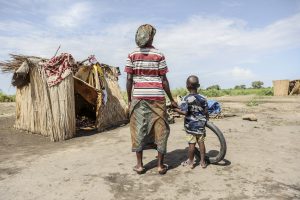Since the publication of its first report on Afghanistan in 2001, Watchlist has produced over 25 reports detailing the situation of children in conflict-affected countries. Based on research conducted by our staff on the ground, Watchlist’s Field Monitor reports bring the voices of affected children, their families, and their communities directly to high-level policy makers. Watchlist’s policy research, based on interviews with key stakeholders including policy makers and child protection practitioners, provide thoughtful insight into addressing contemporary challenges for the protection of children in armed conflict.
The purpose of these reports is not only to shed light on grave violations against children in armed conflict, but also to draw the attention of policy makers to these children’s needs. Watchlist’s Field Monitors and in-depth policy notes provide targeted recommendations to key actors and constitute the basis for further advocacy and action.
Counterterrorism and Detention of Children
Conflicts today are increasingly intractable, intense, and complex, creating unprecedented threats to children’s rights. With the proliferation of counterterrorism strategies and policies, many governments have introduced new measures that lack adequate safeguards for children and have, in many cases, led to serious violations of their rights.
Children in these contexts are often doubly victimized; they not only fall prey to violence and abuse from armed groups, but, in at least 15 conflict-affected countries, they are also imprisoned by government authorities for their alleged association with those groups. Empowered by new or amended counterterrorism legislation, these governments are more likely to treat children recruited or used by armed groups as security threats or criminals. Security forces sometimes detain children in inhumane conditions, without sufficient access to food, health care, or education. Many children are never formally charged and are held incommunicado for indefinite periods of time. Some children have even died in custody.
Attacks on Health Care
In many conflict-affected countries throughout the world, parties to conflict are committing systematic attacks on hospitals and health care, with devastating impacts for children and other civilians. This includes bombing, looting, and occupying health facilities; shooting and stealing ambulances; threatening or forcibly detaining health care workers; and denying passage at checkpoints to persons either attempting to reach hospitals to receive lifesaving treatment or deliver essential medicines and supplies. Attacks on health care compound challenges to children’s health, already exacerbated by weeks, months, and in some cases years of armed conflict. The situation has further worsened since 2020, as health systems struggle to respond to the COVID-19 pandemic.
More Reporting on Grave Violations Against Children
Through its on-the-ground research, Watchlist has detailed the recruitment and use of child soldiers, abductions, sexual violence, and other grave violations against children across over 15 countries affected by armed conflict.




